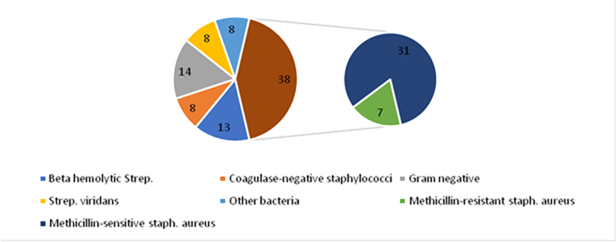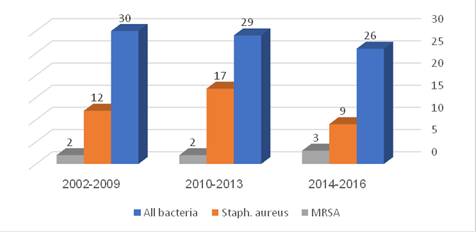Session Information
Session Type: ACR Poster Session B
Session Time: 9:00AM-11:00AM
Background/Purpose: Septic arthritis (SA) is caused mainly by Staphylococcus aureus(S. aureus). Methicillin-resistant S. aureus (MRSA) SA is increasing and accounts for 25-50% of all S. aureus SA cases in the US. Most coagulase- negative staphylococci(CNS) isolated from joints represent a contamination, however after surgical arthroscopy, multiple procedures, and joint replacement these may be true infection. Gram negative pathogens are less common.
The purpose of this study is to examine the prevalence of S. aureus in comparison to other pathogens and whether there is an increase in the prevalence of antibiotic resistance in adults with natural and prosthetic joints in one medical center over 15 years (2002-2016).
Methods: The study population included patients aged 18 years and older who were diagnosed with culture positive SA between January 2002 and December 2016, based on ICD-9 encoding . Cases were reviewed regarding culture and treatment for septic arthritis. Children under the age of 18, patients in whom a diagnosis of contamination was made and cases with culture negative SA were excluded.
Results: A diagnosis of SA or suspected SA was made in 323 cases of which 85 had proven SA. In 9 cases a diagnosis of culture negative SA was made.
Two-thirds of the patients were males. Median age was 74 (23-95) years, and most SA cases were community acquired, and in natural joints. The most common joint involved was the knee and in almost all cases it was monoarthritis. 10% of the patients had evidence of previous infection in a joint in the past year. The median duration of in-hospital treatment was 16 days.
Fifteen patients had an infection of a prosthetic joint. In 3 cases the infection occurred in a prosthesis in which a revision was performed during the past year. Polymicrobial growth was found in three cases.
Conclusion: The most common cause of SA is Staph. aureus. This finding is in consistent with the literature. Our study suggests that there is no evidence of an increase in antibiotic resistance among pathogens that cause SA in prosthetic and natural joints in adults. In addition we did not find increase in the rate of MRSA SA over the course of 15 years.
Figure 1: Pathogens isolated in cases of SA
Beta hemolytic strep group: Group A, B and G Streptococci.
Gram negative: Haemophilus parainfluenzae, E. Coli, Enterobacter cloacae, Pseudomonas aeruginosa, Moraxella catarrhalis, Neisseria spp, Salmonella group d and Stenotrophomonas koreensis.
Other: Propionibacterium acnes, Leuconostoc sp., Enterococcus sp., Strep. pneumonia and Listeria monocytogenes.
Figure 2: Staph areous cases in comparison to all other bacteria over the years 2002-2016
To cite this abstract in AMA style:
Breuer GS, Zamir A, Nesher G, Ben Chetrit E. Antibiotic Resistance Trends Among Bacteria Causing Septic Arthritis at One Medical Center between 2002-2016 [abstract]. Arthritis Rheumatol. 2018; 70 (suppl 9). https://acrabstracts.org/abstract/antibiotic-resistance-trends-among-bacteria-causing-septic-arthritis-at-one-medical-center-between-2002-2016/. Accessed .« Back to 2018 ACR/ARHP Annual Meeting
ACR Meeting Abstracts - https://acrabstracts.org/abstract/antibiotic-resistance-trends-among-bacteria-causing-septic-arthritis-at-one-medical-center-between-2002-2016/


